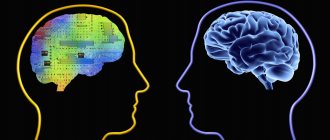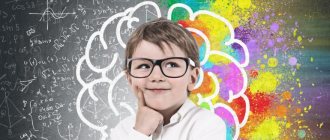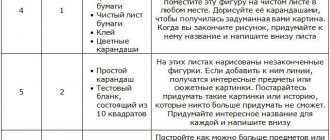The essence of the concept of “logical thinking”
Logic is not identical to knowledge, although its area coincides with the area of knowledge. Logic is the general connoisseur and judge of all particular studies. It does not set out to find evidence; it only determines whether evidence has been found or not.
Logic does not observe, does not invent, does not discover - it judges. So, logic is the science of the functions of the mind that serve to evaluate evidence; it is a teaching both about the process of transition from known truths to unknown ones, and about all other mental actions, insofar as they help this process. © John Stuart Mill
To begin with, let us examine separately the two components of the concept of logical thinking - logic and human thinking.
What is logic? Translated from Greek, logic is called “the science of true thinking” and “the ability to reason.” In the generally accepted sense, logic is the science of the methods and laws of human intellectual activity. Logic is the study of methods for achieving truth using experience and knowledge gained previously.
Thinking is considered to be a mental process during which previously received information is processed and interdisciplinary connections are established. Thanks to objectivity and correct thinking, a person has the opportunity to get an idea of the true state of things.
Taken together, we get a definition of what human logical thinking is. This is a thought process during which logic is used and logical constructs are applied. The goal of this type of thinking is to arrive at valid, objective conclusions based on available information.
Forms of abstract thinking
With abstract thinking, a person operates with different knowledge and mental experiences. Over time, all this came to a certain system. Many phenomena of the world are not subject to sight, hearing or touch (and about some we can say that they do not exist at all as such). But such phenomena are part of human life, and therefore must have at least some form.
There are three main forms of abstract thinking: concept, judgment and inference. Let's talk about them briefly.
Concept
A concept is a thought that conveys a common property of various phenomena. Properties may vary, but be homogeneous and similar, which allows them to be combined into one group. Let's take a car for example. It can be an SUV, sedan or hatchback; Different cars have different shapes, colors, characteristics. But their common feature is that they all have wheels, an engine, a gearbox, etc., and that they can be driven. These characteristics (design, purpose) allow properties to be classified into one group.
And we are taught such things from the cradle. Mom talks about “cat”, and we immediately understand that this is a meowing and purring four-legged animal with a tail, etc. Cats come in different breeds and colors, but they all have common characteristics by which they belong to the general concept of “cat” or “cat”.
Judgment
A person uses judgment with the intention of confirming or disproving something. It can be simple or complex. Here is a simple thing - “the cat meows” - it can be expressed specifically and unambiguously. But the complex one - “the cat began to meow because he was hungry” - can be expressed in several declarative sentences.
Also, propositions can be true or false. True ones reflect the actual state of affairs and are based, as a rule, on the absence of an individual assessment of a person, i.e. he judges objectively. A false judgment becomes when a person expresses his interest based on personal reasons, and not on what is actually happening.
Inference
An inference is a thought formed by two or more judgments. This is a new – more complex judgment. Any inference consists of a premise, a conclusion and a conclusion. The premise is an initial judgment, the conclusion is logical thinking leading to a conclusion.
These three forms of abstract thinking form its basis. We operate all abstractions with their help. But what we have said (forms and types of abstract thinking and abstractions, their goals, etc.) may not be entirely sufficient for understanding abstract thinking and its features, since, in essence, all this is theory. Therefore, it makes sense to talk separately about specific examples.
Areas and uses of logic
There is no branch of human life where the use of thinking skills using logic is required. Including the humanities, which are no exception; logical constructs are also used in their study.
Often, a person’s logical thinking manifests itself at an intuitive level, regardless of the efforts made. The use of logic makes it possible to speed up the thinking process, make it better, express your thoughts more correctly, and also draw true conclusions, avoiding false judgments.
Why you need to develop the ability to think logically:
- Express all your thoughts and arguments clearly and in an accessible form;
- Quickly find the right solution to problems, even in a critical situation;
- Correct your mistakes, avoid making new mistakes;
- Developing the skills to build objective connections helps you achieve success in your career or study;
- A creative approach to problem solving is sometimes more productive than generally accepted standards.
How to develop logic and thinking in a teenager
Tasks, puzzles and charades
On the Internet you can find many puzzles that you and your teenager can try to solve. Try to look for tasks that contain the correct answer - if the goal is not achieved, you can see how it could have been achieved.
A special application with tasks for a smartphone
On Google Play you can easily find an application called “Logic, Problems, Puzzles” - it can be installed on your smartphone. The essence of the application is to develop analytical skills in adults and adolescents. There are also apps like Brain Training, Lumosity and many others.
Structure of logical thinking
Many people think that logical thinking is the ability to brilliantly solve puzzles and tricky problems. However, this is not quite true. The structure of logical thinking includes many thinking skills, such as the ability to make correct conclusions, succinctly argue one’s point of view during debate, specify, generalize, analyze and systematize acquired knowledge.
Human logical thinking is divided into three points: figurative, verbal (verbal) and abstract.
- Figurative-logical thinking . This type of thinking is based on visualization of problems and a visual search for solutions. Simply put, figurative appearance can be another name for the property of imagination.
- Abstract logical thinking . Logical structures contain abstract models, that is, unreal objects that do not exist in nature. In order to thoroughly master this type of thinking, an individual must be able to abstract from the material.
- Verbal and logical thinking . Manifests itself through the use of speech structures. Successful verbal thinking requires not only the construction of strict logical chains, but also competent, coherent speech.
How to develop ingenuity and intelligence
Many factors influence intelligence and ingenuity. If you are forced to subject your body to constant stress, then it is not surprising that your reactions will leave much to be desired. During peak periods, the human body produces cortisol, which has a detrimental effect on brain cells. If you have to take on a ton of things in the morning, then you should try to slow down your usual pace of life at least a little. Start by not jumping out of bed immediately after the alarm clock rings - allow yourself some time (15-25 minutes) to lie down and think about the coming day.
Ways to improve your intelligence
Music.
Periodically take a break from the daily hustle and bustle by listening to music. By the way, scientists believe that classical works are very useful for activating the brain. For example, people who listen to Mozart from time to time are characterized by increased speed of thinking.
Don't waste energy.
Don't take on many tasks at once. To do something well, it is important to focus on it. If you have to answer a letter, talk on the phone and listen to the news at the same time, then, of course, attention will begin to dissipate among several sources of information. The result will be a decrease in concentration and even the level of intelligence.
More positive.
Do not deny yourself positive emotions - your performance directly depends on them. Visit parks more often, go to the movies, meet friends.
Development.
Regularly search the Internet for exercises to develop memory and enrich your vocabulary. It is unlikely that you will be “illuminated” by unexpected solutions if you have a poor vocabulary that is almost unable to hold anything in your head. To develop memory, learn poetry, just read books.
When logical thinking begins
Only a few people think logically. Most of us are biased, prejudiced, infected with preconceptions, jealousy, suspicion, fear, pride and envy. © Dale Carnegie
A person is not born immediately with certain inclinations to successfully draw correct conclusions and build logical structures. Human logical thinking is not an innate, but an acquired property. Even the basic type of figurative thinking appears in children at 1.5 years old. The ability to think abstractly appears much later - at primary school age, at approximately 7-8 years. Logic develops gradually with the development of the personality itself. However, regular training and exercises will only give positive results in the development of logical thinking.
The main type of development of preschool children is precisely logical tasks and exercises. Since it is logical thinking that will help a child achieve success in the future by using his intellect. Development occurs in a playful way, according to the age characteristics of children. Logic lessons are included in both the kindergarten and school curriculum. However, parents should not neglect independent studies at home. After all, by developing logical thinking, you improve your child’s intellectual skills.
Is it possible for an adult to improve and improve his logical thinking? Of course, this is possible and even necessary, because in the modern world everything is subject to very rapid changes, the knowledge acquired at school and university gradually becomes outdated, and there is a need to update information. Developing the ability to build logical conclusions for an adult can be a very enjoyable process, since, as in the case of children, it can take place in a playful way. If you are an eternal student or a typical pedant, then you can draw up a detailed plan for serious exercises. However, it will be much more interesting to get together with friends and play logic games. Information obtained in this way will settle more reliably in the mind and be fixed in a person’s memory than dry memorization of rules and solving boring problems.
Logic is a tasty treat for the mind
This is exactly what the students wrote on the board before the start of one of our logic circle classes. What is the beauty of logic problems?
- they will be equally interesting to both children interested in mathematics and “humanities”;
- many of them do not require knowledge of the school curriculum;
- Even a preschooler without reading skills can solve them (for example, Sudoku, puzzles, puzzles with matches, “gears” and other problems in pictures).
Children love solving logic problems and riddles. They are interested! When I worked at school, I saw that the children coped with the program, mechanically memorizing how to solve certain standard problems.
And problems with stars immediately enlivened the class; both strong and weak students were included in the discussion process. At home, the children could and wanted to explain this task to their parents themselves. But even these problems with asterisks were located randomly on the pages of the textbook; no system was developed.
Bitno Galina Mikhailovna head teacher of LogicLike, teacher of the highest category
Only a systematic and integrated approach creates favorable preconditions for the formation of non-standard thinking. “Food for the mind” should also be balanced and varied. Try it yourself and invite your children to solve just such a selection of problems. This will help identify those links in logic that need to be worked on more diligently.
Ways to develop logical thinking
If you are determined to take up pumping your brain, then the first thing you need to do is eradicate your laziness and start looking for suitable methods and tasks. There are a huge number of ways to train your thinking. Let's look at some of them in more detail:
- Board games . Couples and for a large group of friends, serious and humorous - the choice is huge, you just need to determine which type is more interesting to you. The most popular board games for developing human logical thinking include:
- Chess;
- Checkers;
- Backgammon;
- "Monopoly" ("Big Business");
- “Scrabble” (“Scrabble”, “Bulda”);
- Card games (“Munchkin”, “Uno”).
- Logic problems . When searching for and selecting logical problems, use books or the Internet, which is full of various examples and thematic collections. Start with the easiest level, gradually increasing the load, moving towards the highest level of difficulty. If you don’t know the answer, don’t hesitate to peek, because knowing the source data will help you understand the solution and the construction of a logical chain. This type of task includes:
- Puzzles;
- Graphic puzzles;
- Word problems;
- Puzzles;
- Anagrams;
- Puzzles;
- Rubik's Cube;
- Solitaire games (“Mahjong”, types of card layouts).
Example of a logical problem : Seven sisters spend their leisure time together. The first one plays chess. The second one is reading. The third one is cleaning. The fourth one is watering the flowers. The fifth one is playing with the cat. The sixth one is embroidering. What does the seventh sister do? Correct answer: The seventh sister plays chess with the first.
- Test tasks for intelligence . There are many online tests based on the principle of cause and effect. Most often these are games of the “Find the odd one out” type.
- Puzzles, crosswords, scanwords, chainwords, etc. Particularly difficult are the digital types - Japanese crosswords and Sudoku. Also, an excellent task for developing the ability to think logically would be to independently compose a crossword puzzle.
- Mastering deductive and inductive methods . Deduction is logic in its purest form. In 99.99% of cases, the deductive method gives the correct answer to the problem. In everyday life, induction is more often used - reasoning based on facts that have a certain percentage of falsity. In simpler terms, inductive reasoning begins with particular conclusions and seeks confirmation in general concepts. The deductive method, on the contrary, originates from the external world, and the conclusion is already presented in the form of individual conclusions.
Example of a deductive method : Winter has come and that’s why it’s snowing outside.
Example of the inductive method : It snowed outside, therefore winter has come.
Synopsis of the psychological lesson “Development of verbal-conceptual thinking”, grades 3-4
Psychological lesson in elementary school.
Abstract Goal: creating a favorable atmosphere for self-disclosure of participants, development of verbal-conceptual thinking, increasing the general level of ideas about the world around us, developing vocabulary, developing the ability to establish meaningful logical connections, developing written speech, bringing joy to oneself and others. 1. Information The psychologist informs students that during the classes they will receive knowledge that is applicable in everyday life, they will competently express and formalize the content of their thoughts orally and in writing. Today in class, after completing a series of exercises, they will increase their vocabulary, level of ideas about the world around them, and also learn to establish meaningful logical connections. 2. Introductory part. Exercise - warm-up “Crystal ball”. Goal
: creating a favorable atmosphere for self-development.
Progress.
The exercise is carried out in a circle.
The presenter takes out a crystal ball from the “magic” box, then asks the children, passing the ball around, to tell what good happened to them today. 3. Main part. 1. Exercise “Arrange the words” (from a particular concept through an intermediate concept to a general concept)” Goal:
development of verbal-conceptual thinking, increasing the general level of ideas about the world around us.
Progress.
The psychologist explains that, in addition to particular and general concepts, there are words denoting an intermediate degree of generality, i.e.
if they are compared with particular concepts, then they will be more general in relation to them, and when compared with general concepts they will be more particular. For example, the concept “dog” is more general in relation to the particular concept “poodle” and particular in relation to the more general concept “animal”. Then the teacher shows three word cards. Students must arrange them from left to right so that the concept on the leftmost is particular, the one on the right is the most general, and in the middle is intermediate in generality, i.e. particular in relation to the right concept and general in relation to the left concept. Words to present: Mineral - fuel - oil. Shower - precipitation - rain. Forest plant - tree - oak. Reservoir - lake - Baikal. Edible mushroom ~ mushroom - oil can. A cow is an animal - a domestic animal. Reservoir - river - Volga. Woodpecker is a forest bird. Meadow grass ~ grass - clover. Body of water - Atlantic Ocean - ocean. (Particular concepts are in bold, intermediate ones in italics.) 2. Exercise “Make new words by changing one letter in the word.” Goal
: development of vocabulary Progress
Students
are offered the words: role, mouse, village, bow, code, hole, hand, grove.
Sample answers:
role - moth, salt, pain, zero, steering wheel;
mouse - bear, fly, midge, tower, crumpet; village - body, business, lard, village, hay, solo; bow - ray, meadow, face, hatch, varnish, branch, beech, beetle; code – com, count, cat, kon, year, genus, move, ked; nora – note, leg, mountain, time, bark, Nyura; hand - river, pike, beech, flour; night – zero, daughter; grove - dew, rose, horns, robe, mug, company, Roma. 3. Exercise “Find the error.” Goal:
development of the ability to establish semantic logical connections, development of written speech.
Progress
Students are given suggestions in which they need to correct mistakes: 1. In winter, apple trees bloom in the garden.
2. Below them lay an icy desert. 3. The boy broke the ball with glass. 4. After the mushrooms there will be rains. 5. In spring, the meadows flooded the river. 6. The snow was covered with a lush forest. 3. Final part. Exercise “Let’s give each other a smile.” Goal:
bringing joy to yourself and others.
Children stand in a circle. They gently hold hands and smile at each other, thereby giving their comrades a good mood. 4. Reflection. Purpose
: summing up the lesson, discussing the results of joint activities.
— Questions from the psychologist: — What did you do in class? — What did you learn during the lesson? — What was easy and what caused difficulties? Literature: 1. Lokalova, N.P. 120 lessons on the psychological development of younger schoolchildren (psychological program for the development of the cognitive sphere of students in grades I–IV). Part 2. Materials for lessons in psychological development / N.P. Lokalova. - - 5th ed., erased. – M.: “Os-89”, 2011. 2. Akimova, M.K., Correctional and developmental exercises for students in grades 3-5 / Akimova, V.T. Kozlova. - M., 1993. 3. Tikhomirova, L.F. Logics. Children 7-10 years old/L.F. Tikhomirov. - Yaroslavl: Development Academy: Academy Holding, 2001.
We recommend watching:
Synopsis of a psychological training session for younger schoolchildren Plan - synopsis of an art - therapeutic lesson for younger schoolchildren Synopsis of an open lesson by a teacher-psychologist Master class of a teacher-psychologist for younger schoolchildren
Similar articles:
Lesson for younger schoolchildren “Cultivating willpower”
Human logical thinking: why you need to develop logic
Perhaps some people believe that it is not at all necessary to develop logical thinking; you can do just fine without using logical connections. Such judgments are fundamentally wrong. After all, logical thinking and human activity are inextricably linked. Even in everyday life, you should have the skills to build objective chains. For example, in ancient times people were able to save lives thanks to logic and observations - if their fellow tribesman ate a berry and died, then it is quite logical that others should not eat these berries. Or, for the first gardeners and farmers, such skills were useful in order to know that if, for example, you plant a cherry pit, then, logically, a cherry will grow from it and nothing else.
We will not consider the benefits of constructing mental structures for managers or representatives of technical professions. Even an ordinary janitor understands that sweeping dust against the wind is absolutely illogical. Or the painter, using logical connections, will not begin painting the floor from door to wall.
Therefore, a person’s logical thinking plays an important role in building a successful career; logic is the key to normalizing communication between people, the ability to defend and argue one’s opinion, as well as to realize the truth and objectivity of everything that happens.
Topics: Personal growth, Intelligence development











